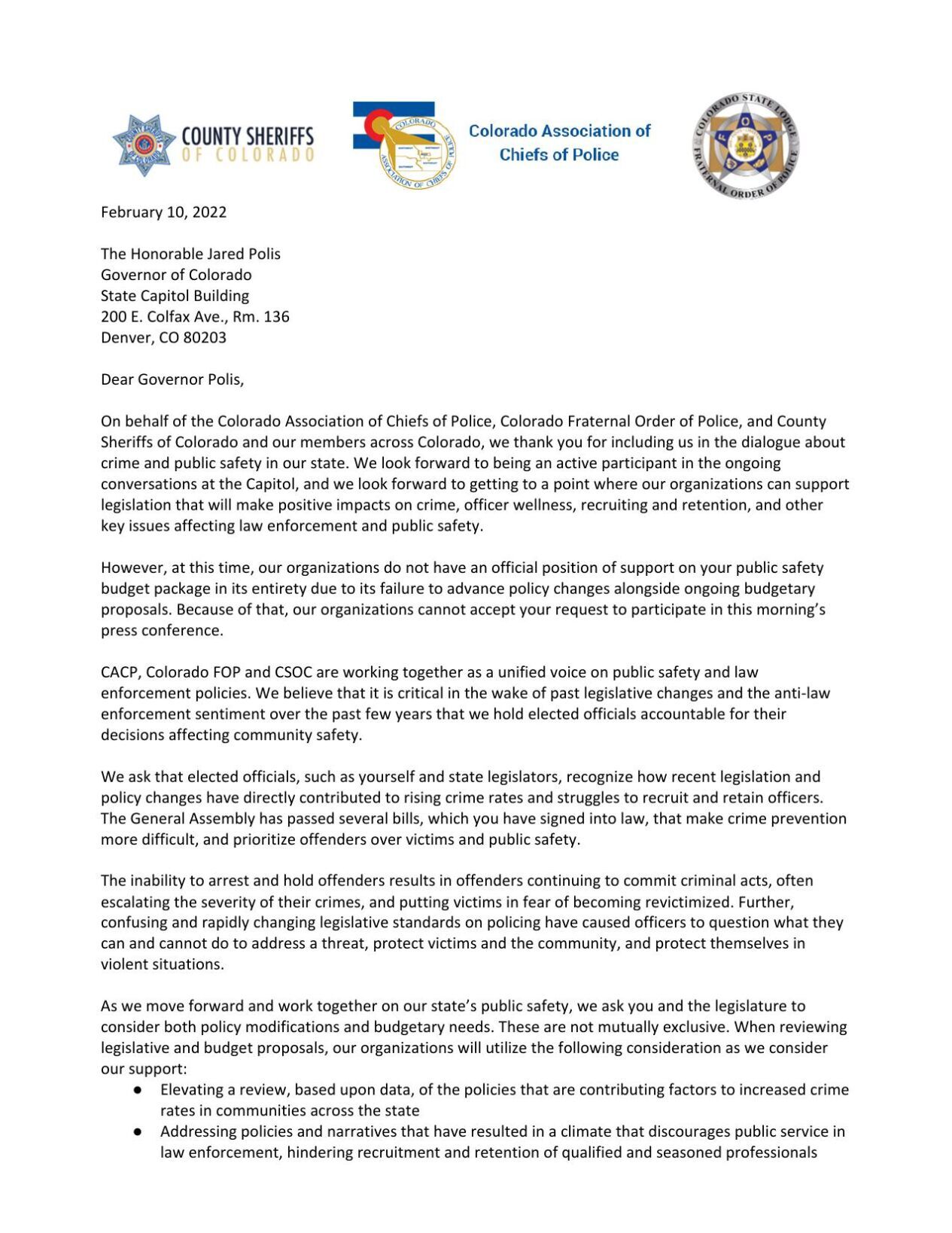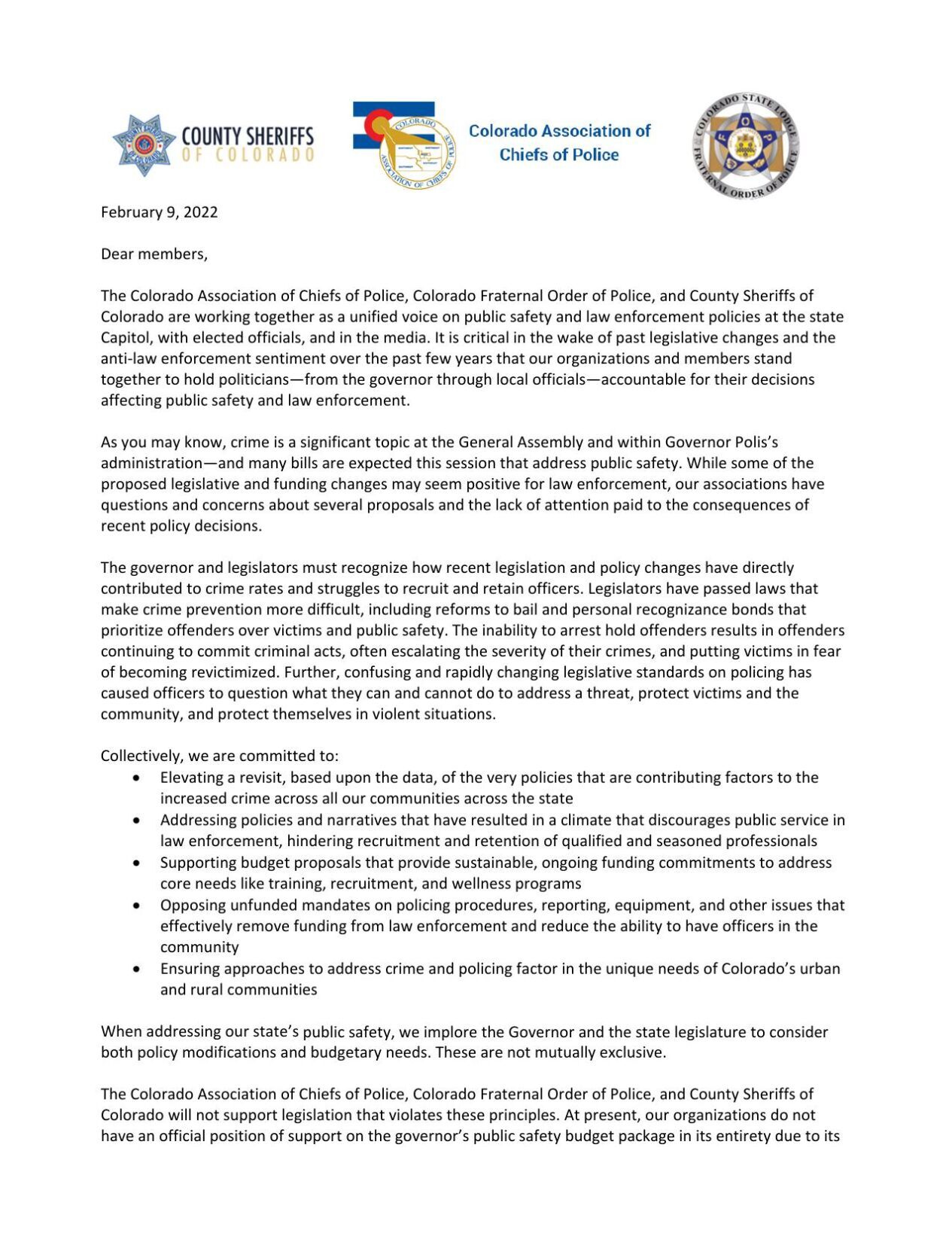Law enforcement groups withhold support for Polis’ public safety pitch
Three of the state’s largest law enforcement groups told Gov. Jared Polis in a letter Thursday that proposals pushed by Democrats in the legislature — which he has signed into law — have contributed to soaring criminality in Colorado and made prevention more difficult.
The new laws, the coalition said, have collectively prioritized offenders “over victims and public safety.”
In the letter, the Colorado Association of Chiefs of Police, the Colorado Fraternal Order of Police and County Sheriffs of Colorado also decried an “anti‐law enforcement sentiment” permeating policy discussions at the state Capitol that they said created a climate that discourages law enforcers and hinders recruitment and retention efforts.
“We ask that elected officials, such as yourself and state legislators, recognize how recent legislation and policy changes have directly contributed to rising crime rates and struggles to recruit and retain officers,” said the letter signed by Gregory Knott, president of the Colorado Association of Chiefs of Police, Stephen Schulz, president of the Colorado Fraternal Order of Police and Amy Nichols, executive director of County Sheriffs of Colorado.
In their letter, the three law enforcement leaders disclosed that the Polis administration asked their organizations to join the governor in unveiling a public safety package in a news conference on Thursday. They said they don’t have an official position on the strategy “due to its failure to advance policy changes alongside ongoing budgetary proposals.”
“Because of that, our organizations cannot accept your request to participate in this morning’s press conference,” they said.

The groups outlined several points, notably that recent policy changes have made the crime situation worse.
“The inability to arrest and hold offenders results in offenders continuing to commit criminal acts, often escalating the severity of their crimes, and putting victims in fear of becoming revictimized,” they said. “Further, confusing and rapidly changing legislative standards on policing have caused officers to question what they can and cannot do to address a threat, protect victims and the community, and protect themselves in violent situations.”
The groups also sent their members a separate letter raising the same points. That letter added that they “have questions and concerns about several proposals and the lack of attention paid to the consequences of recent policy decisions.”

The lament is not new.
Last month, law enforcement leaders and other officials in the Pikes Peak region urged the Colorado legislature to undo policies they view as responsible for soaring crime rates in the state. Republican Colorado Springs Mayor John Suthers said the 2022 legislative session is likely to produce more proposals that would “undermine public safety,” citing a study from the Denver-based Common Sense Institute, which found that the average monthly crime rate in Colorado is 15% higher in 2021 than the year before, and 28% higher than it was a decade ago.
Suthers — along with El Paso County Sheriff Bill Elder, Colorado Springs Police Department Deputy Chief Adrian Vasquez and District Attorney Michael Allen — expressed wariness over policies that ultimately aim to reduce the prison population. They cited legislation that shortened sentencing for the possession of 4 grams of fentanyl or less to a misdemeanor, reduced the maximum sentence a person can serve in a county jail after being convicted of a misdemeanor to 364 days, and reclassified certain crimes from felonies to misdemeanors.
State Sen. Pete Lee, a Democrat from Colorado Springs who has led the criminal justice reform movement at the Capitol and argued for restorative justice and other diversion measures, earlier defended the policies he has championed. Lee said the Common Sense Institute report looks at an outcome that has many causes, not just legislation, much of which so new it hasn’t had time to affect the crime numbers. He said the report doesn’t consider the effects of domestic violence, which lawmakers have sought to curb in recent sessions, or the rise of anger because of social media, guns and other societal causes.
Lee argued the “lock up everybody” mentality has a much longer track record of failing communities, victims and families.
The letter to Polis from the law enforcement groups revealed efforts by the governor’s administration to come up with a slew of public safety proposals that presumably will get introduced in the General Assembly soon.
The law enforcement groups said they are thankful that the governor included them in the dialogue, and added that they look forward to “getting to a point where our organizations can support legislation that will make positive impacts on crime, officer wellness, recruiting and retention, and other key issues affecting law enforcement and public safety.”
They urged policymakers to consider policy changes and budgetary needs affecting law enforcement.
They said they will view legislative proposals using a set of standards that includes reviewing whether measures would contribute to increased crime rates, supporting sustainable funding to address training, recruitment, and wellness programs, and opposing “unfunded mandates on policing procedures, reporting, equipment, and other issues that effectively remove funding from law enforcement and reduce the ability to have officers in the community.”




